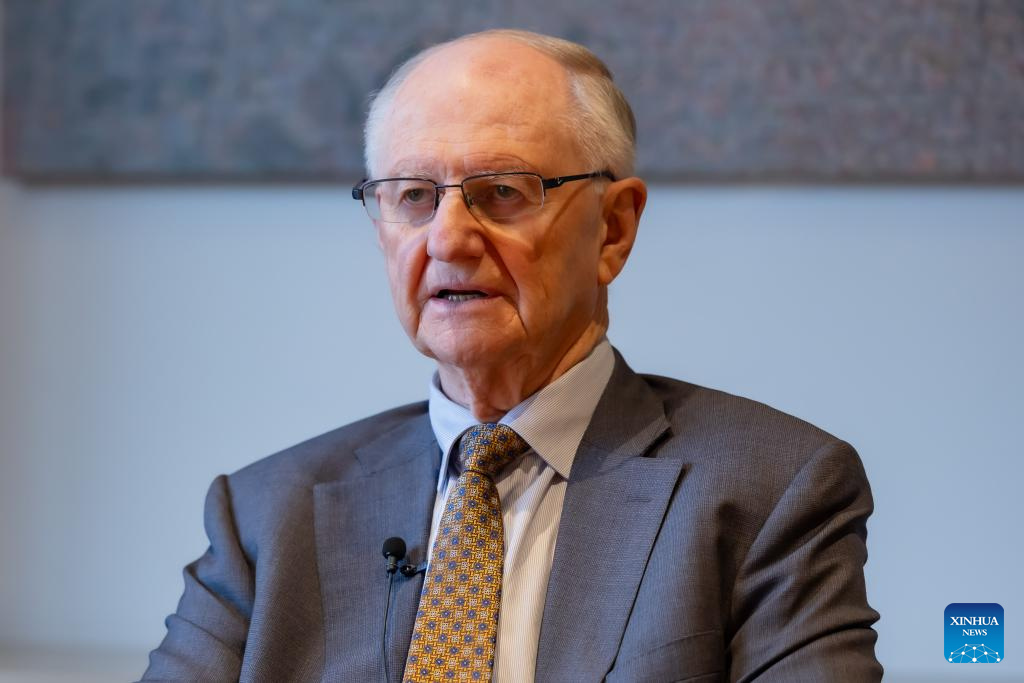
This photo taken on July 3, 2023 shows Australian economist Peter Drysdale during an interview with Xinhua at the Australian National University (ANU) in Canberra, Australia. (Photo by Chu Chen/Xinhua)
by Yue Dongxing
CANBERRA, July 13 (Xinhua) -- An agenda truly multilateral in its purpose is needed as the world economy is facing a period of "considerable uncertainty", an Australian economist has said.
"First of all, you know most of the advanced countries are suffering significant inflation and monetary authorities are tightening monetary policy to address the inflation problem," said Peter Drysdale, head of the East Asian Bureau of Economic Research and East Asia Forum at the Crawford School of Public Policy at the Australian National University (ANU).
In a recent interview with Xinhua in Canberra, Drysdale pointed out that there are also some fundamental problems in the longer term that the world has to work through in order to ensure that there is not a period of significant slow in growth over a longer period of time.
"Importantly, the uncertainty that's associated with the decoupling and fragmentation in the international economy puts breaks upon the huge potential of the transformation that we have to make in order to decarbonize the global economy," he said.
"And it makes the investment environment and the trade environment uncertain and affecting that transformation. So in the longer term, the world economy faces potentially a period of slower growth if we don't address those problems actively."
Drysdale, widely recognized as the leading intellectual architect of Asia-Pacific Economic Cooperation (APEC), said the economies in Asia and the Pacific suffer from these global problems as well.
"Many countries in the region are trying to push back against the decoupling and de-risking, trying to avoid a retreat by unilateralism in international trade," he said.
"So I think we need to press forward in Asia with an agenda that is truly multilateral in its purpose. It's a matter of actually doing things and acting in the multilateral spirit and addressing the issue that we confront in the fragmentation of the world economy."
Drysdale, the Emeritus Professor of Economics at ANU, visited China in the first half of this year. He said though facing challenges, the Chinese economy did very well as it bounced back out of COVID-19.
In June, the People's Bank of China (PBOC), the central bank, cut the interest rate of its one-year MLF (medium-term lending facility) from 2.75 percent to 2.65 percent, amid efforts to strengthen counter-cyclical adjustment and stabilize market expectations.
Drysdale said it was an important step, and the reform process is geared up to ensure that China becomes the major motor of economic growth in the global economy again.
He said through actions like the application to join the Comprehensive and Progressive Agreement for Trans-Pacific Partnership (CPTPP) demonstrate that China is willing to being a big component, important supporter of the multilateralism global economy.
China is Australia's largest two-way trading partner in goods and services, accounting for nearly one third, or 32.2 percent of the country's trade with the world, according to the Department of Foreign Affairs and Trade (DFAT).
Drysdale, whose research interests range from Asia Pacific economic integration to International trade and economic policy, said the potentials are there for both China's economy and the bilateral cooperation for the two countries.
"We in Australia have a lot of stake with China in the realization of that potential," he said.
"In particular, we're two very complimentary economies in which there's a huge resource trade and energy trade relationship between us that serves, for example, the bulk of China's iron steel industry."
The economist said in the next 20 to 30 years, the transformation in trade and industry would bring more opportunities for the two countries.
"There's a potential for growth and productivity associated with that growth in China, feeding into our economy, into economies around the region, around the world," he said.
"So the potential is there. All we're gonna to do is work together to build the confidence and get the policy settings right to ensure that potential is realized." ■
